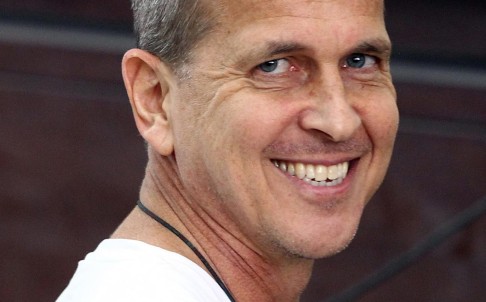Egypt releases Al-Jazeera journalist Peter Greste after more than year in jail
Calls for Cairo to release remaining reporters as Peter Greste heads back to his native Australia after more than 400 days in jail
PUBLISHED : Monday, 02 February, 2015, 12:38am
UPDATED : Monday, 02 February, 2015, 12:38am
Agence France-Presse in Cairo

Journalist Peter Greste.
Egypt deported Al-Jazeera reporter Peter Greste to his native Australia yesterday after holding him for more than 400 days despite global condemnation.
Greste departed on a flight to Larnaca, Cyprus soon after his release from Cairo's Tora prison, interior ministry and airport officials said.
The Al-Jazeera English reporter was detained along with two colleagues, Canadian-Egyptian Mohamed Fahmy and an Egyptian producer, Baher Mohamed, in December 2013 and charged with aiding the blacklisted Muslim Brotherhood movement.
The Qatar-based channel welcomed Egypt's decision and expressed hope that its other two journalists would be released.
"We're pleased for Peter and his family that they are to be reunited," Mostefa Souag, acting director general of Al-Jazeera Media Network, said.
"We will not rest until Baher and Mohamed also regain their freedom," he said.
Fahmy's relatives also expect him to be deported under a decree passed by President Abdel-Fattah el-Sisi that allows for the transfer of foreigners on trial. But it was not clear when he would be released.
The arrest of the three reporters set off a global outcry, with Washington and the UN leading calls for their release.
Australia and Canada have piled pressure on Egypt to release the pair and Sisi had repeatedly said he regretted they had not been deported after their arrest.
Their high-profile trial, in which Greste and Fahmy were sentenced to seven years in prison and Mohamed to 10, proved a public relations nightmare for Sisi, who has cracked down on Islamists since toppling president Mohammed Mursi in July 2013.
The verdict was overturned and a court in January ordered a retrial for the three journalists.
"There is a presidential decision to deport Peter Greste to Australia," an interior ministry official said, minutes before he departed from Cairo airport.
Greste and Fahmy are eligible for deportation under a recent law that stipulates their trial in their home countries. There is no prospect that Greste or Fahmy would face trials in their home countries and Sisi's decree appears to have been formulated in a way that allows Egypt's authorities to save face.
Rights group Amnesty International said Greste's release should not overshadow the ongoing imprisonment of Fahmy and Mohamed.
The two "must not be forgotten as their colleague Peter Greste is deported from Egypt," the group said.
Police had arrested the journalists at the peak of a diplomatic row between Cairo and Qatar, which owns Al-Jazeera.
The broadcaster had been critical of the deadly crackdown on Mursi's Muslim Brotherhood movement following the Islamist leader's overthrow.
Qatar has since moved to mend ties with Egypt and Al-Jazeera shut down its Arabic-language Egyptian affiliate channel, which backed the Brotherhood.
Greste, who turned 49 in jail, worked for several news organisations including Reuters and the BBC before joining Al-Jazeera's English news channel.
He was the BBC's Kabul correspondent in 1995, and he returned after the US-led invasion in 2001. Since 2009, he was based in Nairobi from where he covered the Horn of Africa, winning the broadcasting industry's Peabody Award in 2011.
